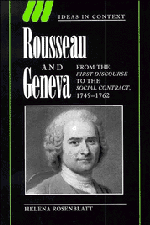Book contents
- Frontmatter
- Contents
- Acknowledgments
- Note on translation
- List of abbreviations
- Introduction. Rousseau in a Genevan context
- 1 The formation of a “citizen of Geneva”
- 2 Rousseau becomes Rousseau, 1751–1754. Geneva, doux commerce, and Rousseau from the First to the Second Discourse
- 3 Rousseau and natural law: the context
- 4 Rousseau and natural law: the Second Discourse
- 5 The “invisible chain”: Rousseau and Geneva from the Second Discourse to the Social Contract
- 6 The Social Contract
- Epilogue
- Select bibliography
- Index
- IDEAS IN CONTEXT
Introduction. Rousseau in a Genevan context
Published online by Cambridge University Press: 28 October 2009
- Frontmatter
- Contents
- Acknowledgments
- Note on translation
- List of abbreviations
- Introduction. Rousseau in a Genevan context
- 1 The formation of a “citizen of Geneva”
- 2 Rousseau becomes Rousseau, 1751–1754. Geneva, doux commerce, and Rousseau from the First to the Second Discourse
- 3 Rousseau and natural law: the context
- 4 Rousseau and natural law: the Second Discourse
- 5 The “invisible chain”: Rousseau and Geneva from the Second Discourse to the Social Contract
- 6 The Social Contract
- Epilogue
- Select bibliography
- Index
- IDEAS IN CONTEXT
Summary
Among all great French thinkers, the first and most essential originality of Rousseau is his being not French, but Genevan.
Rousseau is widely regarded as one of the most important thinkers in the history of Western political thought. In fact, his thought has been characterized as “the lynch-pin of the political consciousness of the entire modern period.” Strangely, however, there is little scholarly consensus on the meaning of his work. Few thinkers have elicited as many discordant and even incompatible interpretations. Hence, Rousseau has been located on all points of the political spectrum: he has been called a totalitarian, a democrat, a reactionary, a progressive, an individualist, a collectivist, a conservative, and an apostle of revolution. The question that invariably comes to mind is “why are there so many different Rousseaus?”
There are several possible answers to this question, but one is that Rousseau has had so many different readers, each one bringing to his reading of Rousseau's text presumptions and premonitions about what Rousseau must have meant by what he said. Another problem is that scholars have tended to look at Rousseau's meaning in the light of his relevance to later political theories and events, thus confusing Rousseau's apparent significance, or influence, with his intended meaning. In short, Rousseau has been read out of his historical context.
Those scholars who have tried to situate him in the context of the French Enlightenment have been forced to recognize that, somehow, Rousseau did not “belong.” It is generally felt that Rousseau's character, outlook, and basic values were very different from those of his French counterparts.
- Type
- Chapter
- Information
- Rousseau and GenevaFrom the First Discourse to The Social Contract, 1749–1762, pp. 1 - 9Publisher: Cambridge University PressPrint publication year: 1997



